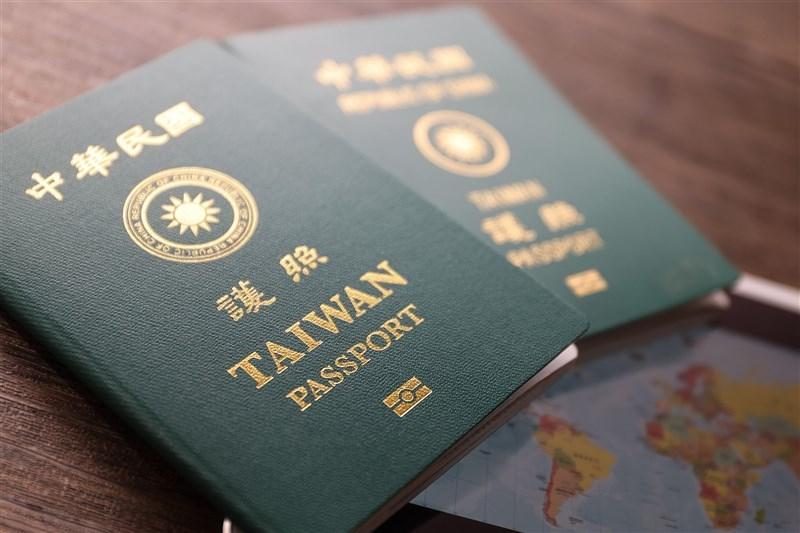Taiwan's government yesterday rejected an online petition that asked for the abolishment of a rule requiring long-term foreign residents to renounce their original nationality as a prerequisite when applying for Taiwanese citizenship.
The Ministry of the Interior (MOI) rejected the petition, which was submitted by civil society organization Crossroads on Aug. 19, by citing the "principle of a single-nationality system" and "taking into account the problems of our country's small territory, dense population, limited resources and national loyalty."
"If foreign nationals who have lived permanently for five years [in Taiwan] can naturalize without having to prove the loss of their original nationality, it may have a significant negative impact on our country's finances, social welfare, and national security," the MOI said in a statement rejecting the petition.

Photo: CNA
"The naturalization system is formulated according to the needs of our country," the statement added, without elaborating.
The MOI also noted exceptions to the rule for "high-level professionals" and "those who have made outstanding contributions."
The petition, which obtained 5,746 online "signatures," had asked the Taiwanese government to "grant immigrants who have legally resided in Taiwan for more than five years as permanent residents a standardized pathway to naturalization without requiring them to renounce their original nationality(s)."
Under current rules, nearly all foreign nationals seeking to naturalize as Taiwanese citizens must first give up their original nationality, a requirement that does not exist in the naturalization policies of countries like the US, Canada, France, Italy and the UK.
Meanwhile, most countries that ban dual citizenship such as Singapore do so for both their own adult citizens and foreign-born applicants while Taiwan’s dual citizenship ban only applies to foreign applicants and not Taiwan nationals, which Crossroads highlighted.
"Taiwan already permits millions of native-born citizens to hold multiple nationalities and reside abroad without question," the civil society group said in a statement on Facebook yesterday.
"Denying the same opportunity to naturalized citizens who live and contribute to Taiwan daily seems inconsistent."
The group said that Taiwan's exceptions to the nationality-renouncing rule are "too narrow" and resulted in "an average of fewer than 50 individuals per year" naturalizing as dual citizens since 2016.
"Currently, there are nearly 40,000 permanent residents, only 0.1 percent of the entire population," Crossroads said in response to the MOI's petition rejection notice.
"With the population expected to shrink dramatically from its peak of 23.6 million in 2019 to approximately 15 million by 2070," the group said, citing official statistics, Taiwan faces a "severe demographic decline" which "underscores the urgency of attracting and retaining contributors to Taiwan's economy and society."

STAY AWAY: An official said people should avoid disturbing snakes, as most do not actively attack humans, but would react defensively if threatened Taitung County authorities yesterday urged the public to stay vigilant and avoid disturbing snakes in the wild, following five reported snakebite cases in the county so far this year. Taitung County Fire Department secretary Lin Chien-cheng (林建誠) said two of the cases were in Donghe Township (東河) and involved the Taiwan habus, one person was bit by a Chinese pit viper near the South Link Railway and the remaining two were caused by unidentified snakes. He advised residents near fields to be cautious of snakes hiding in shady indoor areas, especially when entering or leaving their homes at night. In case of a

A magnitude 6.4 earthquake struck off the coast of Hualien County in eastern Taiwan at 7pm yesterday, the Central Weather Administration (CWA) said. The epicenter of the temblor was at sea, about 69.9km south of Hualien County Hall, at a depth of 30.9km, it said. There were no immediate reports of damage resulting from the quake. The earthquake’s intensity, which gauges the actual effect of a temblor, was highest in Taitung County’s Changbin Township (長濱), where it measured 5 on Taiwan’s seven-tier intensity scale. The quake also measured an intensity of 4 in Hualien, Nantou, Chiayi, Yunlin, Changhua and Miaoli counties, as well as

Credit departments of farmers’ and fishers’ associations blocked a total of more than NT$180 million (US$6.01 million) from being lost to scams last year, National Police Agency (NPA) data showed. The Agricultural Finance Agency (AFA) said last week that staff of farmers’ and fishers’ associations’ credit departments are required to implement fraud prevention measures when they serve clients at the counter. They would ask clients about personal financial management activities whenever they suspect there might be a fraud situation, and would immediately report the incident to local authorities, which would send police officers to the site to help, it said. NPA data showed

ENERGY RESILIENCE: Although Alaska is open for investments, Taiwan is sourcing its gas from the Middle East, and the sea routes carry risks, Ho Cheng-hui said US government officials’ high-profile reception of a Taiwanese representative at the Alaska Sustainable Energy Conference indicated the emergence of an Indo-Pacific energy resilience alliance, an academic said. Presidential Office Secretary-General Pan Men-an (潘孟安) attended the conference in Alaska on Thursday last week at the invitation of the US government. Pan visited oil and gas facilities with senior US officials, including US Secretary of the Interior Doug Burgum, US Secretary of Energy Chris Wright, Alaska Governor Mike Dunleavy and US Senator Daniel Sullivan. Pan attending the conference on behalf of President William Lai (賴清德) shows a significant elevation in diplomatic representation,